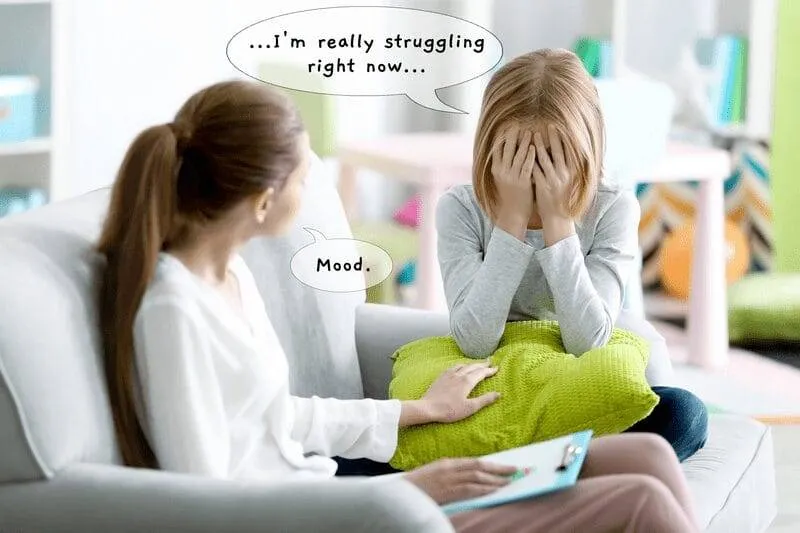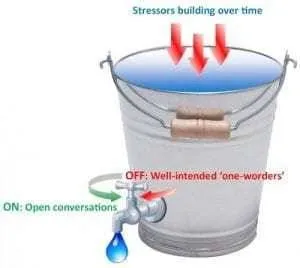How Teenspeak Can Shut Down Conversations about Mental Health
By Alice Gamble
As an 18 year old, two of the most common phrases I hear in response to expressing something about your mental health are “same” and “mood”.
For example:
Teen A: “I feel so stressed”;
Teen B: “Same.”
or
Teen A: “I feel rubbish”;
Teen B: “Mood.”
These two words have become quick and simple ways for young people to respond to their friends’ thoughts and feelings – and, to many, these words may seem like innocent slang used by ‘Generation Z’, much like “lol”.
Unfortunately, from my own experience as an anxiety sufferer, I know that these two short words can have a negative impact on your mental health. They are classic conversation stoppers; it can be pretty hard to expand on something when a few sentences worth of conversation have been summed up in one word!
When you’re struggling with your mental health it’s not just normal stress
In a fast-paced, modern world we have all experienced periods of uncertainty or worry caused by external factors such as work or relationships. However, these periods usually come to an end or arise as the external factor comes and goes; this is known as stress.
Mental health problems (in my case Anxiety) are a bit different. Mental health problems can persist whether or not the cause is clear; a clear cause could be a traumatic life event, but mental health difficulties can also be caused by an accumulation of smaller less noticeable events.
The best analogy I have found for what happens with unclear causes is a bucket of water :
This is where “stress” is now something more. Whilst stress and anxiety are similar, the words are mixed around so much that I feel they have lost their distinction. And I fell into this trap too.
Prior to my GCSE exams at school, saying to my friends, “oh I’m so stressed” – when in reality (unbeknownst to me at the time), it was more than just normal stress. I was suffering from a longer term problem with anxiety.
Most of my friends could distinguish that GCSEs were not the end of the world; that nerves are normal. But they could walk into the exam hall and out (maybe with some tears) and carry on.
I, on the other hand, saw my GCSEs as the deciding factor of my future (partly due to biased thinking patterns where I negatively predict the future, or see things in black and white terms).
I had panic attacks – sometimes even before I had even entered the exam room. I would often sit in the exam in a state of distress, my mind flicking back and forth between positive and negative thinking – both during and after the exam.
Then when the exams were finished, something else would trigger all these feelings again – results day, sixth form and so on. The feelings remained even as the factors came and went, and sometimes I just had the feelings even when I could not work out why.
We need to carefully listen, and carefully respond, to our friends
Much like the lack of distinction between stress and anxiety, ”same” and “mood” easily diminish someone’s mental health problems i.e. if we do not carefully listen to the conversation, notice our friends behaviour or mood.
How easily these words can halt a conversation in which someone may have been crying for help, or finally having the courage to speak to their friends about what is going on:

Without realising, and unintentionally, (B) could have halted the conversation where (A) was going to ask for help or share their problems.
And it is not to say that (B) cannot be feeling the same as (A). In fact when mental health problems are discussed openly it is easy to find that many are suffering similarly, and so new lines of support are potentially opened.
But the words used (if we’re not careful) can diminish someone else’s feelings or halt the conversation. There are better ways to acknowledge if you are feeling the same, perhaps saying:
“I think I understand what you’re going through…”
or
“I’ve been feeling the same lately as well…”,
These more open-ended sentences allow the conversation to continue, and show support and willingness to connect.
My friends helped me to talk about my mental health
When I first realised I had anxiety, I was at a loss of words to describe my feelings around exams; “stressed” worked well and so I continue to use this even though I know it’s something more. But because I have had open conversations with my friends about my ongoing difficulties with anxiety, they know that closer to exams “stressed” for me is not just stressed”.
These conversations only happened because they could continue; my friends did not say “same” after my first sentence, they listened and at the end of the conversation, a few actually said ‘I think I know how you are feeling’.
It turned out they were actually feeling the “same” but, by not just saying that one isolated word, I felt my struggles were understood and mutual support was established.
What a lot of us need when we’re struggling is simply this – for the conversation not to be halted.
Keep open, keep talking!
Other relevant Purple House Blogs:
Our Family In Lockdown (Guest Blog), The Secret to Harmonious Relationships During Lockdown

